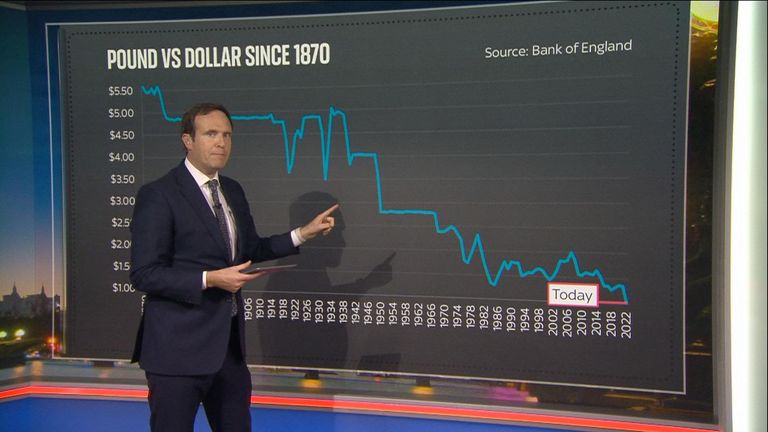The Bank of England’s chief economist has said the government’s mini-budget, which led to the pound falling to a record low against the dollar, will require “a significant monetary policy response”.
Speaking at the International Monetary Policy Forum, Huw Pill reasserted the Bank of England’s willingness to act to rein in inflation.
Mortgage repayments could rise 50% – cost of living latest
“I think it’s hard not to draw the conclusion that all this will require a significant monetary policy response. Let me leave it there,” the member of the Monetary Policy Committee (MPC), which sets interest rates, said.
There will be “challenging times” to bring inflation back to the regulator’s 2% target, Mr Pill said. But he vowed to stick to that target: “Let me assure you, the MPC has a very good understanding of its mandate to maintain price stability and its remit to return inflation to the 2% target.”
Recent market conditions have created “additional challenges”, he added.
The government’s mini-budget last Friday will act as a stimulus to the economy, he said.
Mr Pill described Monday’s announcement from the Treasury, which committed to a further, costed fiscal announcement in November with the oversight of the Office of Budget Responsibility and a spring budget, as “helpful”.
The pound rose 0.85% to $1.07 in response to the announcement.
Read more:
Ian King: Clear signal Bank will raise rates even higher
Ed Conway: The pound has rallied – but the bad news is why
Mr Pill has been the Bank’s chief economist since last September and has consistently voted in line with Andrew Bailey, the governor, and the MPC as a whole on their interest rate decisions.
The Bank asserted yesterday that it is happy to push the brake on the economy by raising interest rates while the government presses the accelerator by cutting taxes.
The conflicting government and currency policies have attracted comment from the International Monetary Fund (IMF).
A spokesperson for the international financial institution said on Tuesday it is important that fiscal policy does not work at cross purposes to monetary policy.
The fiscal measures adopted, following the mini-budget, will likely increase inequality, the spokesperson said.
“Given elevated inflation pressures in many countries, including the UK, we do not recommend large and untargeted fiscal packages at this juncture,” they added.


